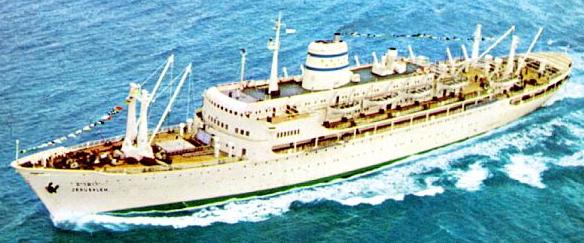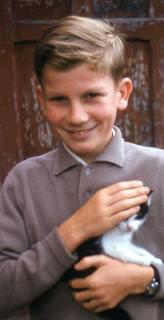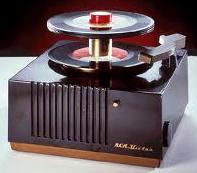 When I was 19 years old, I made my first trip to France. It was a language study trip with an organization called "Classrooms Abroad". I spent the summer in the city of Pau (Pyrénées-Atlantiques), in the south of France. We lived with French families, and spent our mornings studying French at the Institut d'Études Françaises pour Étrangers ("Institute of French Studies for Foreigners"), part of the Université de Bordeau à Pau.
Traveling by sea was not a bad idea. It gave our group of 20 students (15 girls and 5 boys) time to get to know each other. It also provided time for our leader, Mr. Hartle, to test us to determine the level of our French (all of the students had studied French in high school). I had not been a particularly good student of French, so I ended up in the less talented of the two groups.
At some point during the summer, I was introduced to a group of teenage girls. We spoke in French, since none of them spoke English very well. I was thus rather surprised to discover that they had all studied English in school, some of them for six years! Indeed, they could all read English, and they knew all the fine points of things like writing business letters in English. But their education had been almost entirely in written English. They hadn't spent any significant amount of time learning to speak, or to understand English when spoken to them.
Remember that before the days of the Internet, it wasn't all that easy to obtain song lyrics. I recall that one of the songs she asked me about, recorded by Little Richard, went as follows: Tutti frutti, Oh Rudy, Tutti frutti, Oh Rudy, A whop bop-a-lu a, a bop bam boom That one was a bit hard to translate. I told the girls that another rather cryptic song by Harry Belafonte was a "satire", using the French word (the same word as in English, because we stole it from the French). But they were not familiar with the word. I figured I'd made a mistake, but one of them trotted off to get a dictionary, looked it up, and found it. I was rather pleased to have come up with a word that even a group of native speakers didn't know, although I think that was more a reflection on them than on me. Classrooms Abroad organized quite a few nice excursions during the summer, as well as an optional trip at the end that took us around the periphery of France. I recall a trip to Lourdes, during which we participated in an enormous evening program, with thousands of tourists carrying candles singing "Ave Maria", in various languages. It was a rather impressive spectacle, although I think it was even more moving for the Catholic members of our group than it was for me. My favorite excursion of the summer was a visit to the cave at Lascaux, containing probably the best prehistoric cave paintings in the world, a small portion of which are shown below:  I seem to recall descending into the cave in small groups in a cramped elevator, although this was so long ago, my memory may be imperfect. But what I couldn't know at the time was that two years later, the caves would be forever closed to the general public. The exhalations of visitors was causing damage to the precious paintings. Years later, the caves would be laser scanned and photographed, and construction workers and artists would create an exact replica, called Lascaux II. I've since visited Lascaux II twice, but I'm the only person I personally know who's seen the original. Now, courtesy of the Internet, you can take a virtual visit to the cave. Having perused that page a bit, I have to say I'm not clear on whether it was created by photographing the original, or by photographing Lascaux II, the copy. One excursion that sticks in my memory: a trip to a winery. The proud owner opened his cellar to our group. If I'm remembering correctly, there he was aging two different whites and a rosé. Along with cheese and crackers, he served up his wines for our enjoyment by throwing one end of a rubber hose into the top of the large wooden barrels, and siphoning wine into a tray of glasses. It turned out, rather oddly, I thought, that there were a substantial number of girls in our group who simply didn't like the taste of wine. This is not a concept that's easy to explain to a Frenchman, and particularly to a viticulteur (a winemaker). So they politely took a few sips, but then many of them sidled over to me and surreptitiously poured the rest of their wine into my glass. I happily drank it all, and when a bit later our host began explaining how to judge the quality of wines, I was hardly in any condition to absorb his advice. Fortunately, the girls realized that I wasn't walking too steadily, and one of them supported me on each side as they led me out at the end of the visit. To this day, though, I think my French improves if I drink a little wine. The trip had been billed as a French immersion experience, in which the students were expected to speak only French during the summer. That's why it had attracted me - I wanted to see if I could improve my French. But the other students simply wouldn't do this. Although our leader Mr. Hartle only spoke to us in French, the students spoke English among themselves. They simply refused to take the immersion aspect of the trip seriously. I found this rather annoying, but was unable to sway the group. As a result, the summer was somewhat less useful than it might have been, with regard to improving my French. Although I did make great strides in speaking and understanding, I subsequently found out that there's nothing quite like true immersion. A number of years later, I did manage to spend a summer truly immersed in French, when I obtained an engineering training job in a suburb of Paris, along with Larry Beckreck, a college classmate. Unlike the students on the Classrooms Abroad trip, Larry did agree to speak only French, and he stuck with it (see my entry Le stage). It seemed to me, that second summer, that when I spoke only a foreign language, something seemed to click in my brain that caused faster learning. It's as if I unconsciously thought, hey, this English stuff doesn't work any more - I'd better pick up this French thing. I found myself remembering words after a single exposure, which is not usually the case when I'm not immersed. Perhaps your brain doesn't have quite the same motivation to learn if it knows it can fall back on English. Different people have differing reactions to the idea of being unable to speak their native language at all for a substantial amount of time. Certainly, when dealing in a foreign language, it can become difficult to express feelings and other subtle ideas. I recently said to someone that I didn't think it would be a major hardship for me to not be able to express my deepest feelings for a couple of months. She replied, "Well of course, you're an engineer". Although Margie and I have considered some French immersion programs to improve our French, for a long time she didn't think she could go for even two weeks using no English at all. That may be how the other members of the Classrooms Abroad group felt. Margie recently said that now that her French has improved (she takes weekly private lessons), she might be able to manage it. I know a couple who have different native languages - his is French, hers is German (their common language when they met was, and still is, English). The husband once said to me, "You know, you can't really argue in a foreign language." Perhaps that's the secret of their long, successful marriage. Given that I was not that good a student of French in High School, I'm not sure why I took it upon myself to take part in a language study trip. Even though I found it difficult, perhaps a certain enthusiasm for the subject had been transmitted to me in Mr. Canfield's French classes. But I found myself absolutely thrilled by the end of the Classrooms Abroad summer to be able to interact with people who spoke no English at all. There's something fascinating about communicating with people with whom you can converse only because of your own ability to speak their language. It opens up a new world. I later studied German at MIT, although it's a language I have not kept up. Many years then passed, but I ultimately added Spanish and Italian to my linguistic repertory. Improving my ability in these three Latin languages has been a major pleasure for me, particularly in my retirement. It has also enormously increased my enjoyment of European travel. The Classrooms Abroad trip was the opening chapter of a major part of my life. I've written other blog entries about events from that summer. The story of my arrival in Pau can be found in the entry Véronique, and additional tales were recounted in Monsieur L'Oiseau, The Ayache formula (including the Patisserie Effect), and Sehr gut. There's also a short story at the end of the entry Western Ass.
  Note 1:
The S.S. Jerusalem was originally a German ship, that had been given to Israel by Germany in the aftermath of World War II. She was actually the second ship of the Israeli ZIM line to bear that name. Through the wonders of Google, I found information about her the web - click here to see page 1 and page 2. [return to text]
 |


 It turned out they liked to listen to American music, on 45 RPM "singles". These were disks with a big hole in the middle - the technology of the time. As seen to the left, they could be stacked up on a central post, to be played one after another. One of the girls had brought along a record player for our meeting, because she wanted me to help her understand some of the English language songs.
It turned out they liked to listen to American music, on 45 RPM "singles". These were disks with a big hole in the middle - the technology of the time. As seen to the left, they could be stacked up on a central post, to be played one after another. One of the girls had brought along a record player for our meeting, because she wanted me to help her understand some of the English language songs.